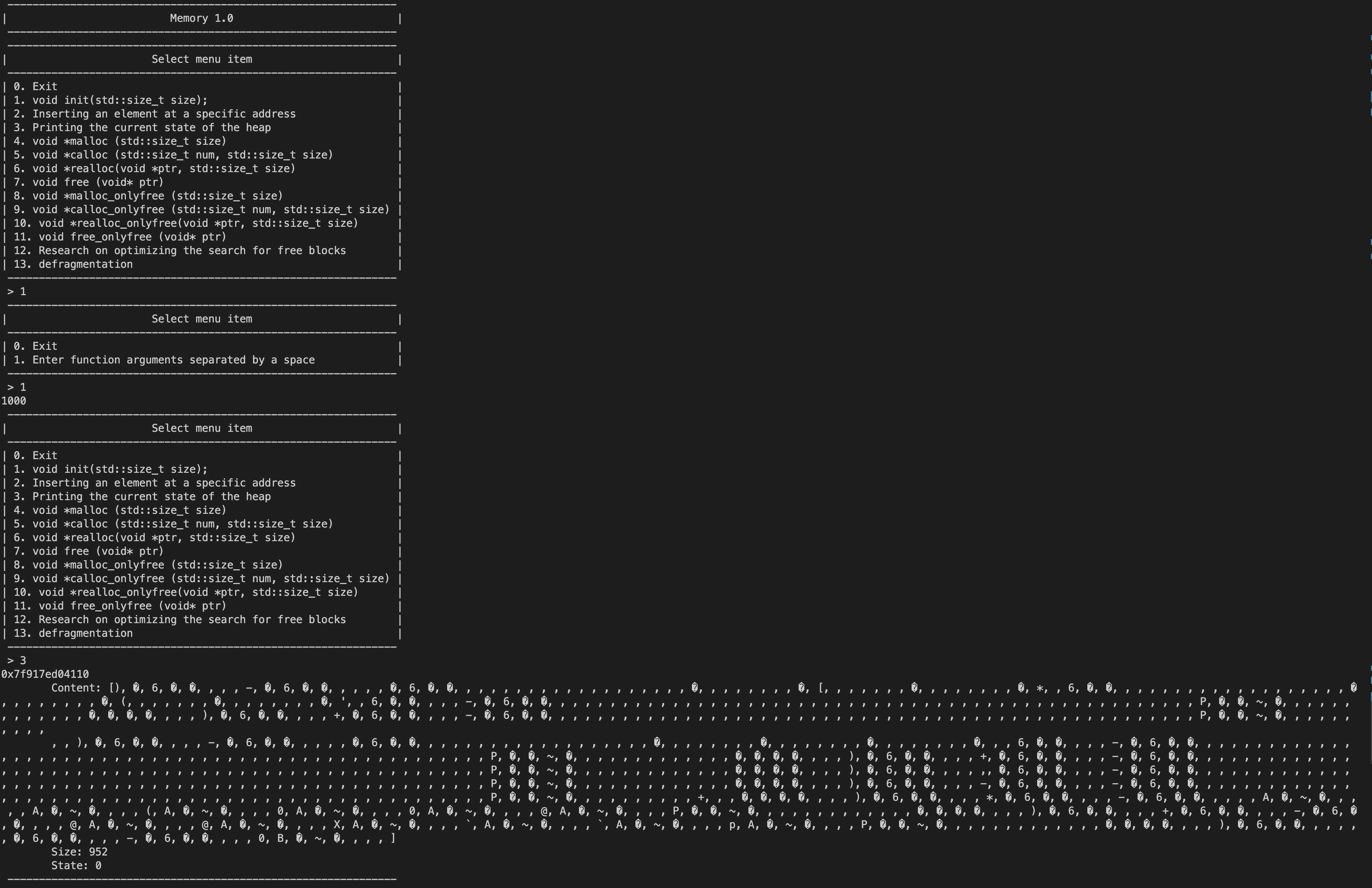This project is an implementation of a memory management library written in C++. The library provides functionality for allocating and freeing memory, and it includes implementations of the malloc, calloc, realloc, and free functions.
This project is an implementation of a memory management library. The goal of the project is to provide a library that can allocate and free memory for other programs. The library includes implementations of the malloc, calloc, realloc, and free functions.
To build the project, simply run the following commands:
cmake -S . -B ./build
cmake --build ./buildThis will create a static library memory.a in the lib directory.
To rebuild the project, run:
make rebuildThis will clean the previous build and install the new version of the library.
The project requires the following dependencies:
- CMake 3.15 or later
- C++17
To use the library in your own project, include the header file memory.h and link with the static library memory.a.
Here is an example of how to use the malloc and free functions provided by the library:
#include <iostream>
#include "memory.hpp"
int main() {
// Allocate memory for an array of 10 integers
int* arr = static_cast<int*>(Memory::malloc(10 * sizeof(int)));
// Set the values of the array
for (int i = 0; i < 10; ++i) {
arr[i] = i;
}
// Print the values of the array
for (int i = 0; i < 10; ++i) {
std::cout << arr[i] << " ";
}
std::cout << std::endl;
// Free the memory allocated for the array
Memory::free(arr);
return 0;
}For more examples of how to use the library, see the examples directory.
| № | Function | Description |
|---|---|---|
| 1 | void *malloc (size_t size) |
The malloc function allocates a size byte memory block and returns a pointer to the beginning of the block. The contents of the allocated memory block are not initialized; they remain with undefined values. If it fails, it returns a null pointer. |
| 2 | void *calloc (size_t num, size_t size) |
The calloc function allocates a block of memory to an array of num elements, where each element is of size bytes, and initializes all its bits with zeros. As a result, a block of num * size bytes is allocated, and the whole block is filled with zeros. It returns a pointer to the beginning of the block; if it fails, it returns a null pointer. |
| 3 | void *realloc(void *ptr, size_t size) |
The realloc function reallocates memory blocks. The size of the memory block pointed to by the ptr is changed to size bytes. A memory block can decrease or increase in size. This function can move the memory block to a new location, in which case the function returns a pointer to the new memory location. The contents of the memory block are maintained even if the new block is smaller than the old one. Only the data that does not fit into the new block is discarded. If the new size value is larger than the old one, the contents of the newly allocated memory will be undefined. Returns a pointer to the beginning of the block, with the original ptr pointer becoming invalid and any access to it being undefined behavior. In case of an error it returns a null pointer and the original ptr pointer remains valid. |
| 4 | void free (void* ptr) |
The free function frees the memory space. A block of memory previously allocated by calling malloc, calloc or realloc is released. That means that the freed memory can be further used by programs or the OS. Note that this function leaves the value of ptr unchanged, so it still points to the same memory block and not to a null pointer. |
| 5 | void *s21_malloc_onlyfree (size_t size) |
The s21_malloc_onlyfree function searches for a free memory block of size bytes, only considering free blocks. If a suitable block is found, it returns a pointer to the beginning of the block. If it fails, it returns a null pointer. |
| 6 | void *s21_calloc_onlyfree (size_t num, size_t size) |
The s21_calloc_onlyfree function searches for a free memory block to an array of num elements, where each element is of size bytes, only considering free blocks. It initializes all its bits with zeros. As a result, a block of num * size bytes is allocated, and the whole block is filled with zeros. It returns a pointer to the beginning of the block; if it fails, it returns a null pointer. |
| 7 | void *s21_realloc_onlyfree(void *ptr, size_t size) |
The s21_realloc_onlyfree function reallocates memory blocks, only considering free blocks. The size of the memory block pointed to by the ptr is changed to size bytes. A memory block can decrease or increase in size. This function can move the memory block to a new location, in which case the function returns a pointer to the new memory location. The contents of the memory block are maintained even if the new block is smaller than the old one. Only the data that does not fit into the new block is discarded. If the new size value is larger than the old one, the contents of the newly allocated memory will be undefined. Returns a pointer to the beginning of the block, with the original ptr pointer becoming invalid and any access to it being undefined behavior. In case of an error it returns a null pointer and the original ptr pointer remains valid. |
| 8 | void s21_free_onlyfree (void* ptr) |
The s21_free_onlyfree function frees the memory space. A block of memory previously allocated by calling s21_malloc, s21_calloc or s21_realloc is released, only considering free blocks. That means that the freed memory can be further used by programs or the OS. Note that this function leaves the value of ptr unchanged, so it still points to the same memory block and not to a null pointer. |
| 9 | void s21_defragmentation() |
The s21_defragmentation function defragments the current heap. It combines all free blocks into one larger block of memory, reducing external fragmentation. The function also updates the metadata of the blocks, including the content_type field if necessary. |
| 10 | template <typename T> bool write(void* ptr, const std::vector<T>& src) |
This function writes a std::vector of type T to a block of memory starting at ptr. The memory block must have enough space to fit the entire vector. If the write is successful, the function returns true; otherwise, it returns false. The T type must be trivially copyable or have a std::copy-compatible iterator. |
| 11 | void dump() |
This function dumps information about all allocated memory blocks to the standard output. For each block, it prints its starting address, content (as a comma-separated list), size, and state (used or not used). It also prints the type of the block, which is set by the write function. If the block contains non-trivially copyable types, the content is printed as a list of characters. |
Note that these two functions are not standard library functions, but rather appear to be part of a custom memory management system implemented by the user.
This project is licensed under the MIT License. See the LICENSE file for more information.



